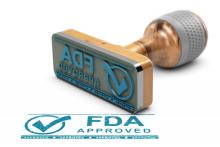User login
The Food and Drug Administration has approved trifarotene cream 0.005% for the treatment of acne vulgaris. The product is manufactured by Galderma under the brand name Aklief.
The approval was based on data from a pair of phase 3, randomized trials including 2,420 patients aged 9 years and older. The trials evaluated the effectiveness of the cream in a once-daily topical dose for facial and truncal acne at 12 weeks. Patients showed a significant reduction in the number of inflammatory lesions as early as 2 weeks on the face (including forehead cheeks, nose, and chin) and as early as 4 weeks on the trunk (including back, chest, and shoulders), compared with a control cream. The most common treatment-emergent adverse events were pain, dryness, discoloration, or rash at the site of application. Some patients also reported sunburn.
The complete study findings were published in the June issue of the Journal of the American Academy of Dermatology.
The studies, funded by Galderma, “showed that once-daily trifarotene cream appears effective and safe, with manageable local tolerability, for the treatment for facial and truncal acne,” wrote lead author Jerry Tan, MD, of the University of Western Ontario, London, and colleagues. “The studies provide substantial evidence to support use of this new topical retinoid in facial and truncal acne,” the researchers wrote.
Trifarotene is designed to target the retinoic acid receptor gamma, the most common retinoic acid receptor in the skin, and is the first new retinoid to be approved by the FDA in approximately 2 decades, according to a press release from Galderma.
The product is expected to be available in the United States in November 2019 in a 45-g pump.
The Food and Drug Administration has approved trifarotene cream 0.005% for the treatment of acne vulgaris. The product is manufactured by Galderma under the brand name Aklief.
The approval was based on data from a pair of phase 3, randomized trials including 2,420 patients aged 9 years and older. The trials evaluated the effectiveness of the cream in a once-daily topical dose for facial and truncal acne at 12 weeks. Patients showed a significant reduction in the number of inflammatory lesions as early as 2 weeks on the face (including forehead cheeks, nose, and chin) and as early as 4 weeks on the trunk (including back, chest, and shoulders), compared with a control cream. The most common treatment-emergent adverse events were pain, dryness, discoloration, or rash at the site of application. Some patients also reported sunburn.
The complete study findings were published in the June issue of the Journal of the American Academy of Dermatology.
The studies, funded by Galderma, “showed that once-daily trifarotene cream appears effective and safe, with manageable local tolerability, for the treatment for facial and truncal acne,” wrote lead author Jerry Tan, MD, of the University of Western Ontario, London, and colleagues. “The studies provide substantial evidence to support use of this new topical retinoid in facial and truncal acne,” the researchers wrote.
Trifarotene is designed to target the retinoic acid receptor gamma, the most common retinoic acid receptor in the skin, and is the first new retinoid to be approved by the FDA in approximately 2 decades, according to a press release from Galderma.
The product is expected to be available in the United States in November 2019 in a 45-g pump.
The Food and Drug Administration has approved trifarotene cream 0.005% for the treatment of acne vulgaris. The product is manufactured by Galderma under the brand name Aklief.
The approval was based on data from a pair of phase 3, randomized trials including 2,420 patients aged 9 years and older. The trials evaluated the effectiveness of the cream in a once-daily topical dose for facial and truncal acne at 12 weeks. Patients showed a significant reduction in the number of inflammatory lesions as early as 2 weeks on the face (including forehead cheeks, nose, and chin) and as early as 4 weeks on the trunk (including back, chest, and shoulders), compared with a control cream. The most common treatment-emergent adverse events were pain, dryness, discoloration, or rash at the site of application. Some patients also reported sunburn.
The complete study findings were published in the June issue of the Journal of the American Academy of Dermatology.
The studies, funded by Galderma, “showed that once-daily trifarotene cream appears effective and safe, with manageable local tolerability, for the treatment for facial and truncal acne,” wrote lead author Jerry Tan, MD, of the University of Western Ontario, London, and colleagues. “The studies provide substantial evidence to support use of this new topical retinoid in facial and truncal acne,” the researchers wrote.
Trifarotene is designed to target the retinoic acid receptor gamma, the most common retinoic acid receptor in the skin, and is the first new retinoid to be approved by the FDA in approximately 2 decades, according to a press release from Galderma.
The product is expected to be available in the United States in November 2019 in a 45-g pump.

